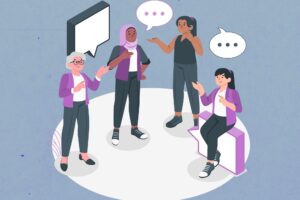
Communication skills are some of the most important skills that we learn in life, and they result in personal and professional success. Whether it’s relating to others, presenting one’s ideas to people, or working with a team, efficient communication is the entryway to achieving goals. This blog will help you understand the top 9 communication skills that you can employ to improve your interactions, secure your career, and reap success in life in every sphere.
Active Listening
What is Active Listening?
Active listening requires a person to hear what is being said, not just to listen to words, but to listen to the message and respond in words that show true appreciation for the speaker. It is to be open to the conversation and to focus actively, not just on the words spoken but on the feelings and the intention behind them. Active listening means paying attention with the purpose of understanding, not just hearing the words that are spoken, withholding judgment and not assuming you know what the other speaker intends to say or wants to convey. It takes work.
Practising listening in this way acknowledges the other person’s viewpoint and tells them that you’re interested in what they have to say and why. Good listening is an essential part of everyday life, both at home and at work. It’s critical to avoid misunderstandings, which can happen when people don’t hear or understand messages being communicated to them.
Benefits
This, in turn, helps build stronger relationships because people who feel truly listened to will tend to open up to others, share more of themselves, be more invested in the relationship, and feel more comfortable and relaxed in each other’s company. In a work context, active listening can promote a better team spirit, resolve conflict and resolve misunderstandings quicker and more effectively, and aid in collaborative work simply because everyone feels heard and respected.
When it comes to personal contexts, active listening can help you forge closer bonds with friends, family members and romantic partners, making conversations more meaningful, productive and supportive. Active listening can help you climb out of conflict and better grasp what others are saying. Is active listening for you? If you find yourself wishing you could be a better listener – or if you want to be an even better listener – active listening is a great place to start.

Nonverbal Communication
Understanding Body Language
Nonverbal communication accounts for a large proportion of how we send and receive messages, and deciphering those messages can be crucial to understanding how other people feel. For example, maintaining eye contact can indicate that a person is engaged with and interested in what you have to say, while crossed arms may signal defensiveness or unease. Being able to read body language can help you to determine how somebody is feeling, even beyond what they are telling you.
These nonverbal cues are as important for communicating how you feel about what others say or do as they are for interpreting them because your body language can reinforce or contradict what you say verbally. For example, if you want to convey positive feedback, smiling and using an open, relaxed posture can reinforce the supportive nature of the words you’ve just uttered.
Impact on Interactions
Learning to communicate nonverbally well helps you to recognise what others feel and what they are trying to say. Your communication will be clearer and richer, deepening engagement and making interaction more comfortable. You will be able to read the room more accurately and better manage meetings, negotiations, and teams, becoming a more insightful communicator. Nonverbal awareness can also help you in dealing with conflict or uncomfortable situations, as you can pick up on signals that someone is uncomfortable or not agreeing with you, even if they have not expressed it verbally.
Within personal relationships, nonverbal communication is similarly vital. The warmth of a hand on the shoulder, a reassuring smile or an attentive gaze all help to strengthen the bond between people and make interactions more genuine and supportive.
Complete Our ‘Communication Skills Rapid Learning’ Course and Fast Track to Effective Communication!
Clarity and Conciseness
Being Clear and Direct
Clear and concise communication involves saying what you mean in the fewest number of words possible. These are two distinct skills: being clear means saying what you mean without getting bogged down in jargon, vague language or complex syntax (words in order, please), so the listener knows exactly what you’re saying. Being concise means that you provide enough information for the listener to grasp the context but don’t burgeon with extraneous detail or filler. Miscommunication is costly at work.
If you want to express yourself clearly and concisely, you need to organise your thoughts before you start speaking or writing. Think about the main point you want to make and the most efficient way to communicate it. In any context – giving instructions, delivering feedback, sharing opinions – the more straightforward your message is, the more likely it is to be understood.

Application
Workplaces run best when clear communication is the norm. If you are presenting a team with instructions, being concise allows you to state your objectives, expectations and deadline in a way that’s easy for the team to digest. If the instructions are written down, they can be referred to later, thus reducing the need for follow-up questions. If the information is too terse, then follow-up questions are inevitable and could lead to the team misunderstanding the original instructions. If the information is too wordy, the whole team might lose focus, and the instructions will be forgotten by the time the team gets back to their desks. It’s a fine balance, of course, and part of possessing this skill is knowing when to be concise and when to be more detailed. The same principle applies to presentations or meetings.
Conciseness and clarity are also valuable in private contexts. Whether it be resolving a conflict with a co-worker or sharing an important piece of news with a loved one, clarity and conciseness help to minimise the risk of miscommunication while expediting the process. In addition to being time-saving, clarity and conciseness help to ensure that our communication with family, friends and loved ones remains as effortless and frustration-free as possible.
Empathy in Communication
Why Empathy Matters
Empathy is the ability to relate to and share the emotional experience of another person, and it is a vital skill for effective communication. It is not enough to know what someone is saying; you have to know what they are feeling and where they are coming from and be willing to respond with compassion and sensitivity. Being empathic means that you are listening not only with your ears but also with your heart. Empathy allows for deeper connections with others because it demonstrates a genuine interest in their well-being. This is a skill that many of us could benefit from improving in both our personal and professional lives. But how can we become more empathic? Does empathy come naturally, or is it something that can be developed? And, if it is something that can be developed, how do we go about doing that?
At work, it can help colleagues to work more effectively together so they can understand each other’s perspectives, motivations and difficulties. In personal relationships, it can enhance emotional bonds, allowing you to provide support and comfort in times of need.

Developing Empathy
The conversation also reinforces the need to be more empathetic. This means consciously thinking about what the other person might be feeling and how they might be viewing things, for example, by pausing before I respond to someone so that I can give myself time to think about what they actually might be feeling (not just what they are saying). Open-ended questions and being genuinely interested in the feelings of the other person are other ways of deepening one’s understanding. A third component of empathy is validation, which is the process of acknowledging that someone else is feeling a certain way. This doesn’t mean you need to agree with how they are feeling, but it does mean that you respect their feelings and care about their well-being.
Furthermore, ‘I can see how you feel that way’ or ‘It sounds like you’re going through a tough time’ can also provide a sense of empathy and show that you are listening. With enough practice, empathy can help create more meaningful relationships and allow you to communicate with greater emotional intelligence.
Public Speaking
Importance of Public Speaking
Public speaking is an essential communication skill that helps an individual to express ideas confidently and clearly in front of large audiences. Whether you have to present something at work, speak at a conference, or lead a team meeting, a good grasp of public speaking skills will boost your professional image and add credibility and influence to your personality. Public speaking is more than just presenting facts and figures. You need to captivate your audience, convey a clear message and make an impact.
Good public speaking also helps to bolster the speaker’s self-confidence so that they can command attention and sound more assured. As leaders seek to motivate their teams, convince stakeholders or drive forward initiatives, strong communication skills are often key.

Tips for Improvement
Public speaking is a skill that can be improved. A great way to prepare is to think about what you want to say before you say it – plan an introduction, some key points and a conclusion to bring your audience along with you. Practice your presentation in front of a small audience so you can get feedback and make your delivery better. It will also help you feel more comfortable speaking in front of a crowd.
Another important aspect of nerves is learning how to control them. You can take some deep breaths, visualise a calm place, and encourage yourself with some positive self-talk. You can focus more on what you are going to say and less on how you feel about saying it – it helps to mentally shift from ‘I’m nervous to speak’ to ‘I’m speaking to share this message’. With practice, public speaking can become a useful tool for communicating effectively and connecting with your audience.
Complete Our ‘Communication Skills Rapid Learning’ Course and Fast Track to Effective Communication!
Conflict Resolution
Managing Disagreements Effectively
There is conflict in all areas where people interact, but the way in which a disagreement is managed can greatly impact the result. Constructive communication is the key to controlling disagreements; it allows both parties to express their concerns without making the other party hostile. Although avoiding conflict might seem easier, the issues are not addressed and can continue to grow over time. Reacting with hostility or frustration only escalates the problem and ruins relationships.
The key to good conflict resolution is calm, lucid and respectful communication in the midst of the conflict. The goal is not to ‘win’ the argument but to resolve it. If we can stay open to each other and the other perspectives in a conflict, we can turn conflict into an opportunity for building better relationships and stronger collaboration.

Steps for Resolution
When conflicts arise, take a step back, calm down, and listen carefully. Hinder the escalation of emotions – and your blood pressure – and allow space for a fruitful discussion. Limit the scope of your confrontation to the specific pain point at hand, not to a series of other issues that you might have regarding your partner, and enter the discussion with the intention of finding a solution that is acceptable for both sides. Listen to your partner without interrupting: be respectful of her point of view, and you will likely neither forget nor misremember it.
Once each side has had its say, brainstorm a solution that works for both of you – perhaps a compromise or a third alternative that addresses both parties’ concerns. Finally, follow up after you’ve resolved the issue to check in and make sure things continue to go well and that both sides are satisfied with the outcome. By approaching conflict in this way, you can learn how to turn disagreements into important opportunities to forge stronger bonds and better teamwork.
Persuasion and Influence
The Power of Persuasion
Persuasive communication is a critically important skill that can impact career advancement, negotiations, and daily interactions. If you’re persuasive, you can convince others to buy into your ideas, align with your perspective, invest in your plans, and embrace your goals. If you’re trying to pitch a project to a tough executive, if you’re trying to negotiate a contract for a big deal, if you’re trying to lead a team to a common objective, then being persuasive can make all the difference. In the workplace, persuasive skills are often associated with leadership since persuasive leaders can use their communication abilities to inspire, motivate and direct their team members toward success.
Finally, persuasion does not involve manipulation – it’s about building a compelling case that’s in line with your audience’s interests and needs that will enable them to see the value in your position.
Techniques for Persuasion
When attempting to persuade, be sure to support your claims with facts and data, as most people prefer evidence and reasoning over emotional appeals and vague generalities. Know your audience, too. When your message is customised to meet your audience’s interests, needs and concerns, your argument becomes more relevant to them.
Aligning your own goals with those of your audience is a second strategy. When the goals of your message are framed in terms of benefits to your audience, people are more likely to consider the idea. For instance, in one negotiation study, when a salary request was framed regarding how both parties would benefit from the salary agreement, people were significantly more likely to say that they would approve the request. Again, when you’re clear, factual, and empathetic, you build trust and an argument for your persuasive case.

Feedback Giving and Receiving
Importance of Constructive Feedback
It is important for both personal and professional growth. When providing feedback, people can improve their performance and reach their full potential. Receiving feedback can help you know where you need to improve. In the workplace, people are able to work together with better understanding through feedback and an open work environment where people are more aware and can continue to learn and grow by informing them of the changes they need to make. Furthermore, it can help resolve small issues before they become bigger problems.
Accepting feedback, even when critical, shows that we are emotionally mature and open to development, and giving feedback in a supportive and constructive fashion enables our important relationships to continue positively while supporting growth.
Giving Effective Feedback
When giving feedback, it’s best to focus on specific behaviours – not the person himself. Instead of saying, ‘You’re always late,’ try: ‘I’ve noticed that you’ve been arriving 10 minutes late for the past week. Is there something preventing you from arriving on time?’ Here, you’re focusing on the behaviour that you want changed, not on any personal judgments about the recipient.
It’s also useful to provide suggestions for improvement so that the recipient knows what to do. Finally, talking about feedback in a positive way – such as talking about strengths before weaknesses – can help keep the conversation constructive and positive. Good feedback can correct performance while also motivating people to grow.
Emotional Intelligence
What is Emotional Intelligence?
Emotional intelligence (EI) is the ability to identify and manage your own emotions and the emotions of others. It’s a vital skill that promotes effective interpersonal communication in both your personal and professional life. EI helps you decode complex social cues, build healthier relationships, and make better decisions. Emotional intelligence is made up of a range of traits, including self-awareness, self-regulation, empathy and social skills. When you have a high emotional intelligence quotient, you’re able to respond to problems in a measured way rather than reacting impulsively.
At work, EQ is especially useful for leadership because it helps you cope with stress in order to improve the overall performance of your team, resolve conflicts, and inspire people by recognising and empathising with their emotional needs.

Enhancing Emotional Intelligence
The first step to improving emotional intelligence is self-awareness:
- Noticing your emotional triggers.
- Understanding how they affect your thought processes.
- Learning to manage them to achieve your goals.
This can be done through practices such as mindfulness and reflection. Secondly, you must regulate your emotions. This means controlling negative emotions such as anger or frustration and responding to whatever is happening calmly and constructively. Calming breathing exercises or simply taking a moment before reacting can help.
Empathy is another component of emotional intelligence and is an important way of building better interpersonal relationships. If you are able to identify with how others feel, for example, then you are building a strong foundation for better social interaction. Lastly, the skills necessary for social interaction, such as listening and communicating with others, can help you build better relationships over time. Ultimately, developing emotional intelligence will help you have better relationships and more effective collaborations in both your personal and professional life.
Complete Our ‘Communication Skills Rapid Learning’ Course and Fast Track to Effective Communication!
Conclusion
Implementing the ten essential communication skills – active listening, empathy, clarity, authenticity, emotional intelligence, personal power, courage, forgiveness, self-confidence, and positive mental attitude – will help you become more successful in your personal and professional lives. Stronger relationships, better teams, and increased career opportunities are just a few of the outcomes you can expect. The more frequently you practise these skills and build upon them; the more successful your interactions and collaborations will be in both your personal and professional life.
